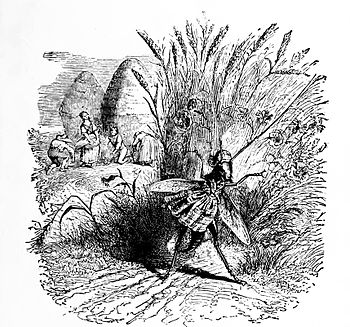The Fables of Florian (tr. Phelps)/The Grasshopper
FABLE XXXVII.
THE GRASSHOPPER.
"'Tis over now, and I must fly!
This odious sight I cannot bear—
The crime, the rage, the misery,
That meet my vision ev'rywhere!
To some obscure retreat I'll go,
Far from abuses, vice, and woe.
The wicked knaves who've cross'd my path,
I'll visit with my studied wrath.
Only because I'd upright be,
I've got the whole world's enmity!
Every man, and child, and beast—
Yes ev'ry little bird,
By hate and envy stirr'd,
Do make of me their scand'lous feast.
Oh base ingratitude!
To treat one thus who is so good.
How little I am understood!
They'll yet regret what they have done;
But only when I'm dead and gone."
Thus in hypochondriac strain,
A grasshopper did once complain.
O'er the world's wrongs he seem'd to groan,
While thinking of himself alone.
A comrade said,—"Holla, my dear!
How did you come by that idea?
Why not enjoy these fields in peace?
They yield for you their rich increase.
Let the world go,
And all is woe.
What is't to you, I'd like to know?
'Tis bad and always will be so.
You cannot shape it to your view
By all that you may say or do.
Besides, my friend, where can you find
A world more suited to your mind?
And as to having this world's spite,
I think you are mistaken quite.
It is a fancy, or perchance
Even a touch of arrogance,
That springs from your o'erweening pride,
Rather than any thing beside."
The grasshopper not even deign'd
To make reply when thus arraign'd,
But forthwith from his old home flew,
To seek a new.
When finally two days were o'er,
He'd made two hundred steps or more,
And fancied that at last he'd found
The end of this world's farthest bound.
The land seem'd new, the people strange,
The wheat-fields offer'd a fine range,
And fill'd him with delight.
Their long stalks waving in the wind,
Gave welcome to his troubl'd mind;
It was a glorious sight!
"Here then," he cried, "all trouble past,
I've found security at last.
No more shall enemies invade
My peace within this friendly shade."
But lo!
When o'er the east spread morning's glow,
A band of reapers came along,
With laugh, and jest, and merry song,
And 'neath their sickles fell the grain
All level with the naked plain;
And to the view the spot disclos'd,
Where our unfortunate repos'd.
"There 'tis again!" the insect cried,
"When will my foes be satisfied?
Turn where I will, I'm still pursu'd,
For having done the world some good!
Scarce have I reach'd this distant land,
When I'm assail'd on ev'ry hand.
These foes come here to seek me out,
And in their mad, infernal rout.
Would almost any means employ,
So that they might my life annoy,
Yes, even their own crops destroy.
I really think to glut their ire,
They'd set their very fields on fire."
Then to the reapers thus he said,—
"Come! let your wrath fall on my head;
You've hunted me like thing accurs'd,
And now, Messieurs, just do your worst!"
A busy worker at the sheaf,
By chance observ'd his mighty grief:
He seized him, held him up to view,
Then flung him where bright flowers grew:
"Go!" he exclaim'd, "where posies are;
Go, little friend, get supper there!"

